人教版(2019)选择性必修 第三册Unit 4 Adversity and Courage复习课件(共54页PPT)
文档属性
| 名称 | 人教版(2019)选择性必修 第三册Unit 4 Adversity and Courage复习课件(共54页PPT) |  | |
| 格式 | pptx | ||
| 文件大小 | 1.2MB | ||
| 资源类型 | 教案 | ||
| 版本资源 | 人教版(2019) | ||
| 科目 | 英语 | ||
| 更新时间 | 2023-01-11 20:20:42 | ||
图片预览


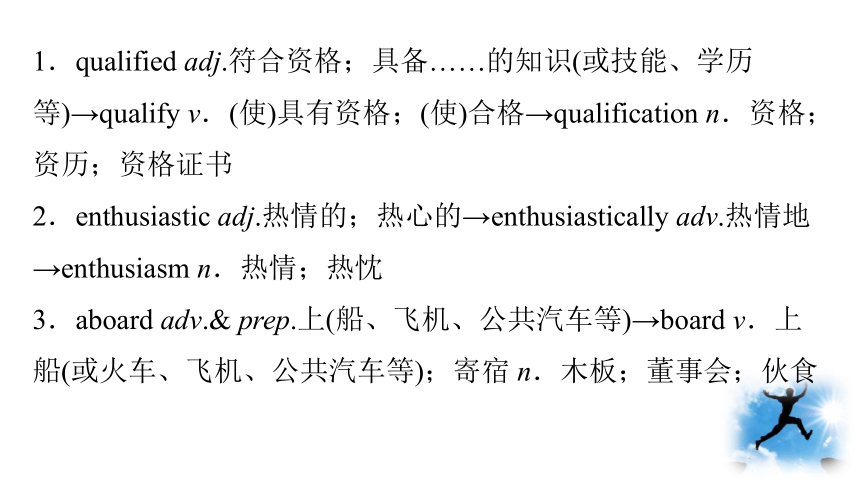
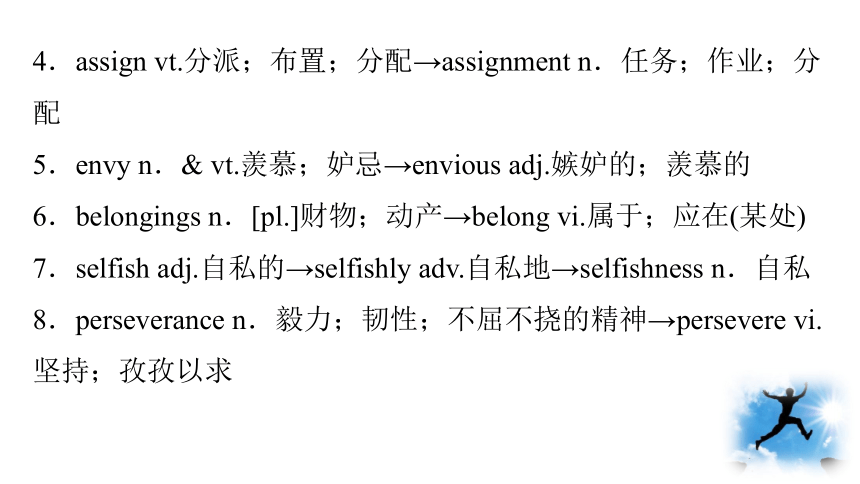
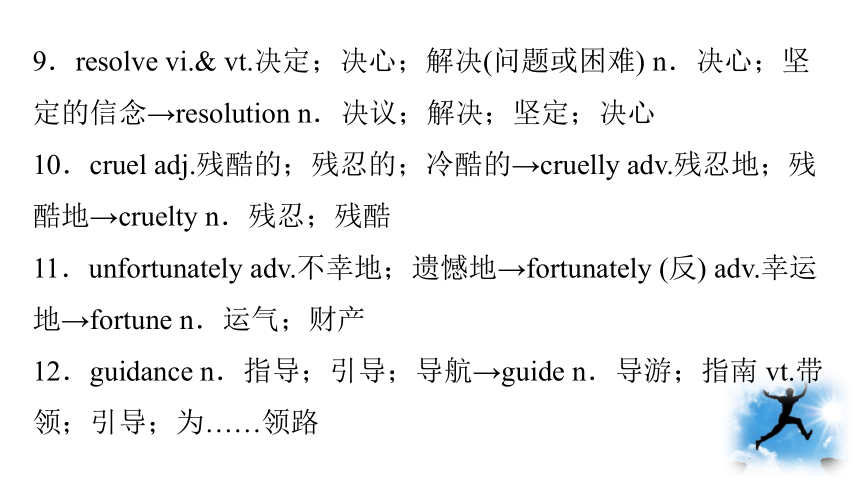
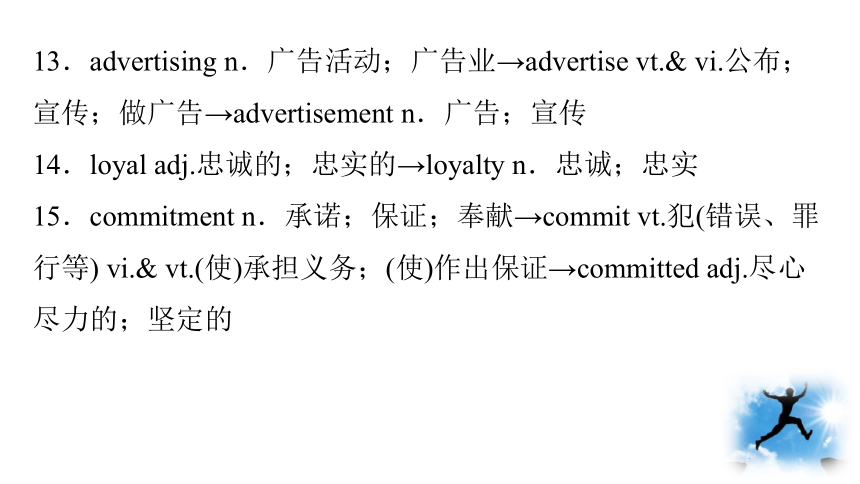

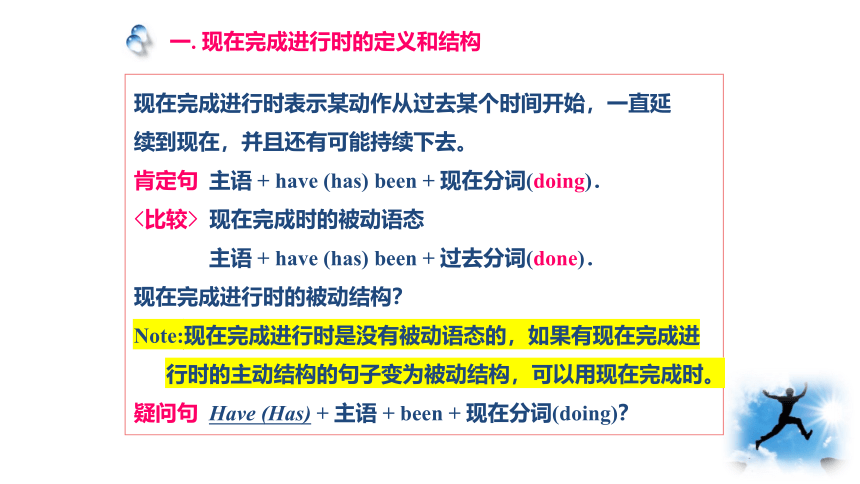
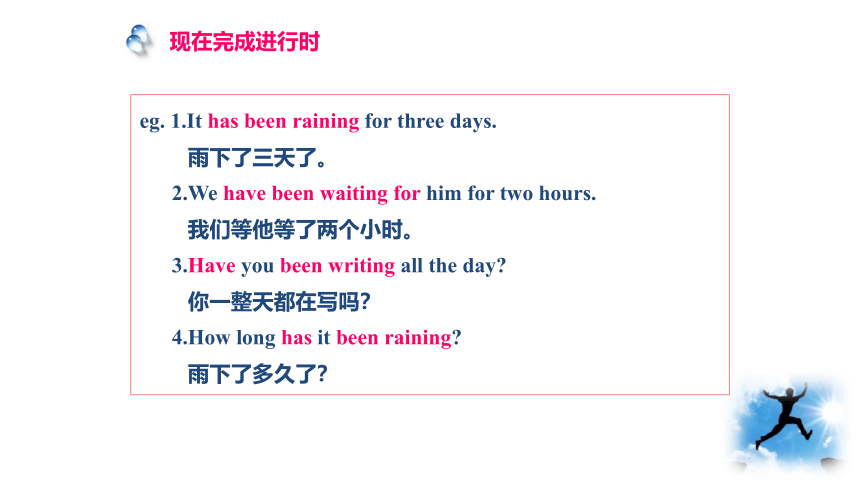
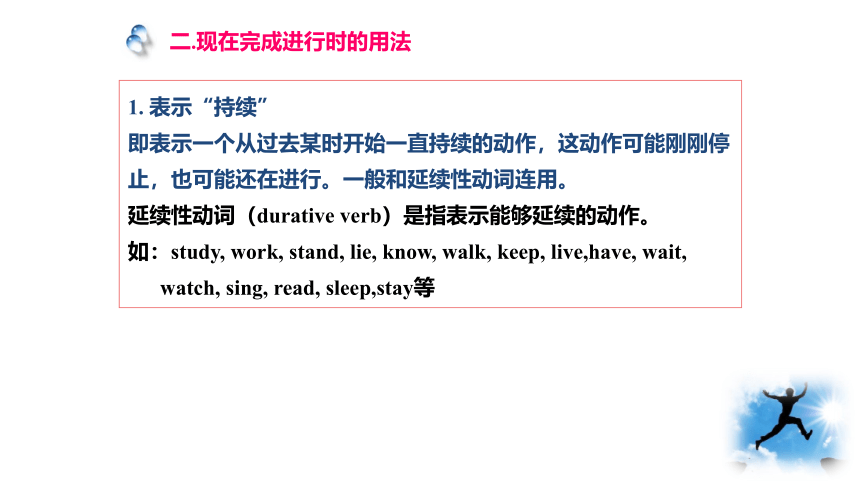

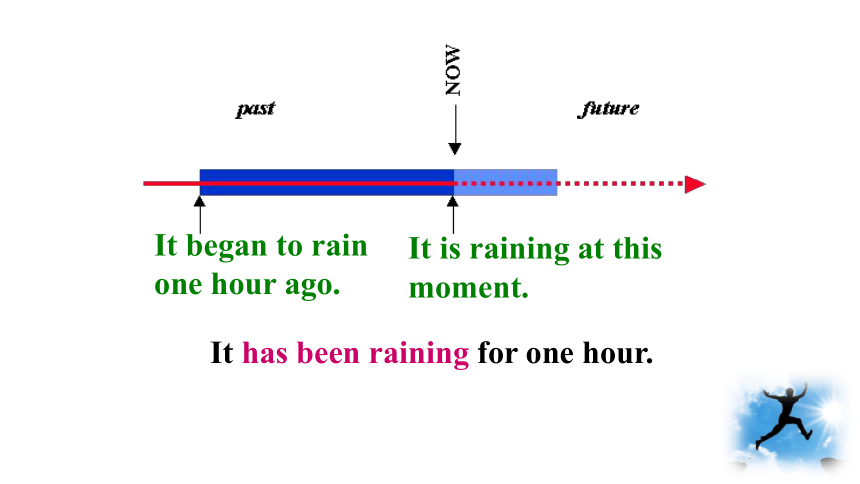
文档简介
(共54张PPT)
选择性必修第三册
Unit 4复习
单词
1.qualified adj.符合资格;具备……的知识(或技能、学历等)→qualify v.(使)具有资格;(使)合格→qualification n.资格;资历;资格证书
2.enthusiastic adj.热情的;热心的→enthusiastically adv.热情地→enthusiasm n.热情;热忱
3.aboard adv.& prep.上(船、飞机、公共汽车等)→board v.上船(或火车、飞机、公共汽车等);寄宿 n.木板;董事会;伙食
4.assign vt.分派;布置;分配→assignment n.任务;作业;分配
5.envy n.& vt.羡慕;妒忌→envious adj.嫉妒的;羡慕的
6.belongings n.[pl.]财物;动产→belong vi.属于;应在(某处)
7.selfish adj.自私的→selfishly adv.自私地→selfishness n.自私
8.perseverance n.毅力;韧性;不屈不挠的精神→persevere vi.坚持;孜孜以求
9.resolve vi.& vt.决定;决心;解决(问题或困难) n.决心;坚定的信念→resolution n.决议;解决;坚定;决心
10.cruel adj.残酷的;残忍的;冷酷的→cruelly adv.残忍地;残酷地→cruelty n.残忍;残酷
11.unfortunately adv.不幸地;遗憾地→fortunately (反) adv.幸运地→fortune n.运气;财产
12.guidance n.指导;引导;导航→guide n.导游;指南 vt.带领;引导;为……领路
13.advertising n.广告活动;广告业→advertise vt.& vi.公布;宣传;做广告→advertisement n.广告;宣传
14.loyal adj.忠诚的;忠实的→loyalty n.忠诚;忠实
15.commitment n.承诺;保证;奉献→commit vt.犯(错误、罪行等) vi.& vt.(使)承担义务;(使)作出保证→committed adj.尽心尽力的;坚定的
语法
现在完成进行时表示某动作从过去某个时间开始,一直延
续到现在,并且还有可能持续下去。
肯定句 主语 + have (has) been + 现在分词(doing).
<比较> 现在完成时的被动语态
主语 + have (has) been + 过去分词(done).
现在完成进行时的被动结构?
Note:现在完成进行时是没有被动语态的,如果有现在完成进行时的主动结构的句子变为被动结构,可以用现在完成时。
疑问句 Have (Has) + 主语 + been + 现在分词(doing)?
一. 现在完成进行时的定义和结构
eg. 1.It has been raining for three days.
雨下了三天了。
2.We have been waiting for him for two hours.
我们等他等了两个小时。
3.Have you been writing all the day
你一整天都在写吗?
4.How long has it been raining
雨下了多久了?
现在完成进行时
1. 表示“持续”
即表示一个从过去某时开始一直持续的动作,这动作可能刚刚停
止,也可能还在进行。一般和延续性动词连用。
延续性动词(durative verb)是指表示能够延续的动作。
如:study, work, stand, lie, know, walk, keep, live,have, wait, watch, sing, read, sleep,stay等
二.现在完成进行时的用法
Summary 1:
1. 我们使用现在完成进行时来表示动作从过去开始一直延续到现在,现在仍在发生将来还可能继续下去。
I have not been sleeping well since I returned home.
_______________________________________________
past present
not being able to sleep well
I’m still not sleeping well.
I returned home.
It began to rain one hour ago.
It has been raining for one hour.
It is raining at this moment.
The boy ________________ (have) dinner since five minutes ago.
(The boy started having dinner five minutes ago. He is still having dinner now.)
has been having
The man _________________ (work) in the field for half an hour.
(The man started working in the field half an hour ago. He is still working now.)
has been working
Summary 2:
我们也可以用现在完成进行时表示动作从过去一直延续到现在刚完成但是中间没有中断过.
Kelly: Sorry I’m late. Have you been waiting long
Mavis: Yes. I’ve been waiting for an hour.
_______________________________________________
past one hour ago present
Mavis started waiting for Kelly.
Kelly arrives.
The boys are tired now ,they_______________ (play) basketball all the morning.
The boys are tired. They _____________ (just play) a ball game.
have just played
have been playing
2. 表示“重复”
即表示在一段持续的时间内动作的多次重复,而这个重复的动作在说话时并不一定在进行,这个动作断断续续重复。
eg. 1)We have been making mistakes like this.
我们一直犯这样的错误。
2)Jim has been phoning Jenny every night for the past week.
一星期以来吉姆每天晚上给詹妮打电话。
二.现在完成进行时的用法
常见的瞬间性动词有:marry, close, die, arrive, fall, leave, go , break, lose, give, join, jump, receive, buy, borrow, start, begin, graduate等。
3.现在完成进行时中时间状语的省略
现在完成进行时在上下文清楚时亦可不用时间状语。
这种现在完成进行时多指“刚才”或“近来”发生的动作,一般不再继续,并往往含有一种直接的结果。
You’ve been working too hard.
你工作太辛苦了。(直接结果可能是你一定很累了)
You’ve been smoking again.
你又抽烟了。(暗含结果是你身上有烟味)
1. Tom has always been working hard.
2. Time has been flying so quickly!
3. What have you been doing to my dictionary
(4)带有感彩,使语言表达更加生动。
What kind of emotion does the writer express in these sentences
赞许的感彩
感叹时间之快
不满的感彩
The usage of the tense (4)
现在完成进行时所用的时间状语:
all day / month; this month / week / year; these days; recently /
lately; in the past few + 时间段; since +时间点; for + 时间段,等。
eg. 1.He has been working all day.
他整天都在工作。
2.They have been building the bridge for two month.
两个月来他们一直在修桥。
3.Car sales have been shrinking recently.
汽车销量近来一直在下降。
4.The two parties have been trying to unite since the New Year.
自从新年以来,双方就一直在试图联手。
三.与现在完成进行连用的主要时间状语
1.现在完成时强调动作的完成,而现在完成进行时强调动作
的延续,因此,表示动作的完成,只能用现在完成时,而
不能用现在完成进行时。
eg. He has changed his idea.
他改变了想法。
We have been studying here for two years.
我们在这儿已经学习了两年了。
四.现在完成进行时与现在完成时的区别
2.现在完成进行时有时含有感彩,而现在完成时一般是平铺直叙。
I have been waiting for you for two hours.
我一直等了你两个小时。(可能表示不满)
I have waited for you for two hours.
我等了你两个小时。(说明一个事实)
3.现在完成进行时强调动作,而现在完成时强调结果。
Who has been eating the oranges
谁一直在吃橘子呀?(还剩余一些)
Who has eaten the oranges
谁把橘子吃了?(强调吃得一个不剩)
4.有些静态动词只能用于现在完成时,一般不能用于现在
完成进行时。
eg. 1)I have known him for many years.
我认识他有许多年了。
2)The war has lasted for a long time.
这场战争持续了很长时间。
四.现在完成进行时与现在完成时的区别
静态动词表示一种静止状态,包括“存在”和“拥有”的动词,如be,have, own, belong, exist, hold(容纳)等;表示度量的动词,如cost, weigh, measure等;表示五官感觉的动词,如see, hear, taste, smell, feel等;以及表示心理状态的动词,如 believe, think, know, remember, forget, understand, love, like ,hate, detest(讨厌)等
四.现在完成进行时与现在完成时的区别
5.与一段时间连用时可以用现在完成时也可以用现在完成进行时;但与次数连用时只能用现在完成时,不能用现在完成进行时。
It hasn’t rained for six weeks.
已经六个星期没下雨了。
It has been raining since yesterday and it is still raining.
从昨天起,雨就没停过,而且现在还在下。
He has rung me up five times since 12 o’clock.
从十二点后,他已经给我打了五次电话。
He has been ringing me up all the morning.
他整个上午一直在给我打电话。
6.这两种时态都可以表示动作的延续,区别在于:现在完成进行时更强调动作的延续性,可以说是现在完成时的强调形式。
We have been living here for ten years.
We have lived here for ten years.
我们在这里住了十年了。
7.在没有时间状语的情况下,现在完成进行时表示动作仍在进行,而现在完成时则表示动作到现在已经结束。
The students have been preparing for the exam.
学生们一直在为考试做准备。(还在进行)
The students have prepared for the exam.
学生们为考试做了准备。(已经结束)
返 回
8.与完成时连用的句型。
1) It is (has been) +一段时间 +since从句.
2) This (That/It) is the first (second…) time + that从句 (从句用现在完成时).
3) This (That/It) is the only … + that-clause (从句用现在完成时).
4) This (That/It) is the best/ finest /most interesting … + that-clause.(从句用现在完成时)
9.现在完成时可表示反复发生的动作,提问时用how many times。而现在完成进行时则表示持续的、不间断的动作,提问时用how long
1)________________have you visited Jinan
…..I have visited Jinan twice this month.
2)_____________have you visited Jinan
……I have been visiting Jinan for two months.
How many times
How long
10.现在完成时的句子中可以用像never、yet、already和ever等作时间状语,而现在完成进行时的句子中则不可以用这样的词
I have already been to Beijing.
I have never been to Beijing.
I haven’t been to Beijing yet.
语言点
(1)He is selfish and bad-tempered.Thus,he will never be enthusiastic
________ helping those in trouble.
be enthusiastic about(doing)sth. 对(做)……热情
lack/be full of enthusiasm缺乏/充满热情
with enthusiasm (=enthusiastically)热情地
adj.热情的;热心的(enthusiastically adv.热情地;热心地 enthusiasm n.热情;热忱)
1
enthusiastic
about
(2)我不仅热情而且容易相处,这使得我能胜任报纸上所刊登的志愿者工作。(应用文写作之个人优势)
,which makes me qualified for the voluntary work advertised in the newspaper.
(3)尽管失败了几次,伯纳德和约翰仍然热情地做爆米花。
(2020·新高考全国Ⅰ,读后续写)
Bernard and John still in
spite of several failures.
made popcorn enthusiastically/with enthusiasm
I am not only enthusiastic but also easy to get along/on with
go aboard上船(飞机、火车等)
on board 在船(火车或飞机)上
go abroad出国
adv.& prep.上(船、飞机、公共汽车等)[board vt.& vi.上船(或火车、飞机、公共汽车等) n.木板;董事会;伙食 broad adj.宽阔的;广阔的 abroad adv.在/到国外;在/到海外]
2
aboard
(1)他身材高大,肩膀宽阔,留着胡子,总是满面笑容。(读后续写之外貌描写)
He is tall and a beard and always__________________.
wears a broad smile
with broad shoulders
(2)得知你将去国外深造,我写信告知你一些必要的注意事项。(应用文写作之告知信)
,I’m writing to inform you of some necessary do’s and don’ts.
(3)这对年轻夫妇一上船,他们就吃东西、说话、大笑,好像他们是这世界上仅存的人。
①The instant ,they were eating,talking and laughing loudly as if they were the only people in the world.(aboard)
②The instant ,they were eating,talking and laughing loudly as if they were the only people in the world.(board)
Learning that you will go abroad for further study
the young couple went aboard the ship
the young couple boarded the ship
envy sb. (doing) sth. 羡慕/嫉妒某人(做)某事
with envy羡慕地;嫉妒地
green with envy嫉妒地眼红;十分羡慕/嫉妒
be envious of羡慕,嫉妒
n.& vt.羡慕;嫉妒(envious adj.嫉妒的;羡慕的)
3
envy
(1)I am (envy) of you,because you are leading such a cosy and decent life.
envious
(2)老实说,我真羡慕你获得了优秀毕业生的称号,我应该向你学习。
Honestly speaking,I the Excellent
Graduate and I should follow your example.
(3)李明不仅学得快,而且善于用逻辑思维解决难题,我十分羡慕。
Not only is Li Ming quick at learning but also he is good at solving tough problems with logical mind. .
do envy you getting the title of
I am green with envy
abandon oneself to(doing)sth. 沉湎于(做)……;纵情于(做)……
abandon doing sth. 放弃做某事
be abandoned to (doing) sth. 沉湎于(做)……
vt.舍弃;抛弃;放弃 n.放任;放纵(abandoned adj.被遗弃的;放纵的)
4
abandon
(1)He abandoned (ask) for his guidance,which was beyond our expectations.
asking
(2)I abandoned myself to computer games.I performed extremely badly in the end-of-term examination.
① ,I performed extremely badly in the end-of-term examination.(用现在分词短语作状语改写)
② ,I performed extremely badly in the end-of-term examination.(用过去分词短语作状语改写)
Abandoning myself to computer games
Abandoned to computer games
vi.& vt.决定;决心;解决(问题或困难) n.决心;坚定的信念(resolution n.决定;解决;决心)
5
resolve
resolve to do sth. 决定做某事
(1)The steward made a (resolve) to visit her relatives more often.
(2)文化遗产代表我们祖先的智慧,因此我们国家已经决定不遗余力地保护它们。(话题写作之文化遗产与保护)
Cultural relics represent the wisdom of our ancestors,so_____________
__________________________________________.
resolution
our country
has resolved to spare no effort to protect them
(3)为了解决冲突,我们应该学会多沟通,设身处地为他人着想。(话题写作之人际沟通)
,we should learn to communicate more and put ourselves in others’ place.
To resolve conflicts
as...as...意为“和……一样”,表示同级比较。其中第一个as为副词,
第二个as为连词或介词。其基本用法为:as+adj./adv.+as...,还有如
下用法:
否定式:not as/so+adj./adv.+as...
倍数+as+adj./adv.+as...
as much/many+名词+as...
How could I become as selfish and bad-tempered as Thomas Orde-Lees!
我怎么能变得像托马斯·奥德利斯一样自私和脾气暴躁呢!
6
as...as...
(1)他和我一样勤奋,因此,他已取得了和我一样多的进步。
He is ,so he .
(2)我们投入的时间和精力是她以前的两倍,所以我深信我们能成功。
We have devoted ,so I am greatly convinced that we will succeed.
(3)在我看来,这本书没有你认为的那么有趣。
As far as I am concerned,the book is .
as hard-working as me
has made as much progress as me
twice as much time and energy as she did before
not as/so interesting as you think
本句为if引导的虚拟条件句,叙述与现在事实相反的假设。虚拟语气在if虚拟条件句中的运用如下:
与现在事实相反,从句谓语动词用过去式(be动词一般用were),主
句谓语动词用“would/could/should/might+动词原形”
与过去事实相反,从句谓语动词用“had+过去分词”,主句谓语动
词用“would/could/should/might+have+过去分词”
与将来事实相反,从句谓语动词用过去式、were to do或should do,
主句谓语动词用“would/could/should/might+动词原形”
If it weren’t for sea animals,we would all starve.
要是没有海上的动物,我们都会饿死的。
7
if引导的虚拟条件句
(1)受邀在这里做演讲我倍感荣幸。今天我的演讲主题是“如果我是一名环卫工人”。如果我是一名环卫工人,我会让我们的城市更干净,让街上没有任何垃圾。(应用文写作之演讲稿)
I feel honored to be invited here to deliver a speech.Today the topic of my speech is “ ”._______________________________
_______________with no rubbish lying on the street.
If I were a dustman
If I were a dustman,I would make
our city cleaner
(2)如果我早听从你的建议,我就会通过这场重要的考试了。
the important
exam.
(3)如果我明天看到他,我就会告诉他我在昨天举行的比赛中获得了第一名的好消息。
_____________________________________________________________
______________that I ranked first in the competition held yesterday.
If I had followed your advice earlier,I would have passed
If I saw/were to see/should see him tomorrow,I would inform him of the good news
课文短语
1 adversity and courage
2 diary entries
3 full of vigour
4 be qualified
5 assign sb to do sth
6 essential supplies
逆境与勇气
日记摘录
精力充沛
具备资格;能胜任
指派某人做某事
必需的供给品
Language points: Important phrases (P37 ~ P39)
1 aspire to (do) sth
2 be diligent in
3 be content with
4 the imperial examination
5 have sth at heart
6 propose doing sth
7 with distinction
追求 / 渴求(做)某事
在……方面是勤奋的
Language Points: Important phrases (P85 ~ P86)
满足于
科举考试
把某事放在心上
提议做某事
以优异的成绩
8 be at peace
9 be promoted to a higher position
10 institute government reforms
11 conservative bureaucrats
12 go into exile
13 Memorial to Yueyang Tower
14 personal welfare
处于和平时期
升职
实行政府改革
保守派官僚
被放逐
岳阳楼记
个人福利
Language Points: Important phrases (P85 ~ P86)
15 serve in a high office at court
16 be concerned for
17 wise words to live by
18 put ... into practice
在朝廷担任要职
对……关心
行为准则
把……付诸实践
Language Points: Important phrases (P85 ~ P86)
选择性必修第三册
Unit 4复习
单词
1.qualified adj.符合资格;具备……的知识(或技能、学历等)→qualify v.(使)具有资格;(使)合格→qualification n.资格;资历;资格证书
2.enthusiastic adj.热情的;热心的→enthusiastically adv.热情地→enthusiasm n.热情;热忱
3.aboard adv.& prep.上(船、飞机、公共汽车等)→board v.上船(或火车、飞机、公共汽车等);寄宿 n.木板;董事会;伙食
4.assign vt.分派;布置;分配→assignment n.任务;作业;分配
5.envy n.& vt.羡慕;妒忌→envious adj.嫉妒的;羡慕的
6.belongings n.[pl.]财物;动产→belong vi.属于;应在(某处)
7.selfish adj.自私的→selfishly adv.自私地→selfishness n.自私
8.perseverance n.毅力;韧性;不屈不挠的精神→persevere vi.坚持;孜孜以求
9.resolve vi.& vt.决定;决心;解决(问题或困难) n.决心;坚定的信念→resolution n.决议;解决;坚定;决心
10.cruel adj.残酷的;残忍的;冷酷的→cruelly adv.残忍地;残酷地→cruelty n.残忍;残酷
11.unfortunately adv.不幸地;遗憾地→fortunately (反) adv.幸运地→fortune n.运气;财产
12.guidance n.指导;引导;导航→guide n.导游;指南 vt.带领;引导;为……领路
13.advertising n.广告活动;广告业→advertise vt.& vi.公布;宣传;做广告→advertisement n.广告;宣传
14.loyal adj.忠诚的;忠实的→loyalty n.忠诚;忠实
15.commitment n.承诺;保证;奉献→commit vt.犯(错误、罪行等) vi.& vt.(使)承担义务;(使)作出保证→committed adj.尽心尽力的;坚定的
语法
现在完成进行时表示某动作从过去某个时间开始,一直延
续到现在,并且还有可能持续下去。
肯定句 主语 + have (has) been + 现在分词(doing).
<比较> 现在完成时的被动语态
主语 + have (has) been + 过去分词(done).
现在完成进行时的被动结构?
Note:现在完成进行时是没有被动语态的,如果有现在完成进行时的主动结构的句子变为被动结构,可以用现在完成时。
疑问句 Have (Has) + 主语 + been + 现在分词(doing)?
一. 现在完成进行时的定义和结构
eg. 1.It has been raining for three days.
雨下了三天了。
2.We have been waiting for him for two hours.
我们等他等了两个小时。
3.Have you been writing all the day
你一整天都在写吗?
4.How long has it been raining
雨下了多久了?
现在完成进行时
1. 表示“持续”
即表示一个从过去某时开始一直持续的动作,这动作可能刚刚停
止,也可能还在进行。一般和延续性动词连用。
延续性动词(durative verb)是指表示能够延续的动作。
如:study, work, stand, lie, know, walk, keep, live,have, wait, watch, sing, read, sleep,stay等
二.现在完成进行时的用法
Summary 1:
1. 我们使用现在完成进行时来表示动作从过去开始一直延续到现在,现在仍在发生将来还可能继续下去。
I have not been sleeping well since I returned home.
_______________________________________________
past present
not being able to sleep well
I’m still not sleeping well.
I returned home.
It began to rain one hour ago.
It has been raining for one hour.
It is raining at this moment.
The boy ________________ (have) dinner since five minutes ago.
(The boy started having dinner five minutes ago. He is still having dinner now.)
has been having
The man _________________ (work) in the field for half an hour.
(The man started working in the field half an hour ago. He is still working now.)
has been working
Summary 2:
我们也可以用现在完成进行时表示动作从过去一直延续到现在刚完成但是中间没有中断过.
Kelly: Sorry I’m late. Have you been waiting long
Mavis: Yes. I’ve been waiting for an hour.
_______________________________________________
past one hour ago present
Mavis started waiting for Kelly.
Kelly arrives.
The boys are tired now ,they_______________ (play) basketball all the morning.
The boys are tired. They _____________ (just play) a ball game.
have just played
have been playing
2. 表示“重复”
即表示在一段持续的时间内动作的多次重复,而这个重复的动作在说话时并不一定在进行,这个动作断断续续重复。
eg. 1)We have been making mistakes like this.
我们一直犯这样的错误。
2)Jim has been phoning Jenny every night for the past week.
一星期以来吉姆每天晚上给詹妮打电话。
二.现在完成进行时的用法
常见的瞬间性动词有:marry, close, die, arrive, fall, leave, go , break, lose, give, join, jump, receive, buy, borrow, start, begin, graduate等。
3.现在完成进行时中时间状语的省略
现在完成进行时在上下文清楚时亦可不用时间状语。
这种现在完成进行时多指“刚才”或“近来”发生的动作,一般不再继续,并往往含有一种直接的结果。
You’ve been working too hard.
你工作太辛苦了。(直接结果可能是你一定很累了)
You’ve been smoking again.
你又抽烟了。(暗含结果是你身上有烟味)
1. Tom has always been working hard.
2. Time has been flying so quickly!
3. What have you been doing to my dictionary
(4)带有感彩,使语言表达更加生动。
What kind of emotion does the writer express in these sentences
赞许的感彩
感叹时间之快
不满的感彩
The usage of the tense (4)
现在完成进行时所用的时间状语:
all day / month; this month / week / year; these days; recently /
lately; in the past few + 时间段; since +时间点; for + 时间段,等。
eg. 1.He has been working all day.
他整天都在工作。
2.They have been building the bridge for two month.
两个月来他们一直在修桥。
3.Car sales have been shrinking recently.
汽车销量近来一直在下降。
4.The two parties have been trying to unite since the New Year.
自从新年以来,双方就一直在试图联手。
三.与现在完成进行连用的主要时间状语
1.现在完成时强调动作的完成,而现在完成进行时强调动作
的延续,因此,表示动作的完成,只能用现在完成时,而
不能用现在完成进行时。
eg. He has changed his idea.
他改变了想法。
We have been studying here for two years.
我们在这儿已经学习了两年了。
四.现在完成进行时与现在完成时的区别
2.现在完成进行时有时含有感彩,而现在完成时一般是平铺直叙。
I have been waiting for you for two hours.
我一直等了你两个小时。(可能表示不满)
I have waited for you for two hours.
我等了你两个小时。(说明一个事实)
3.现在完成进行时强调动作,而现在完成时强调结果。
Who has been eating the oranges
谁一直在吃橘子呀?(还剩余一些)
Who has eaten the oranges
谁把橘子吃了?(强调吃得一个不剩)
4.有些静态动词只能用于现在完成时,一般不能用于现在
完成进行时。
eg. 1)I have known him for many years.
我认识他有许多年了。
2)The war has lasted for a long time.
这场战争持续了很长时间。
四.现在完成进行时与现在完成时的区别
静态动词表示一种静止状态,包括“存在”和“拥有”的动词,如be,have, own, belong, exist, hold(容纳)等;表示度量的动词,如cost, weigh, measure等;表示五官感觉的动词,如see, hear, taste, smell, feel等;以及表示心理状态的动词,如 believe, think, know, remember, forget, understand, love, like ,hate, detest(讨厌)等
四.现在完成进行时与现在完成时的区别
5.与一段时间连用时可以用现在完成时也可以用现在完成进行时;但与次数连用时只能用现在完成时,不能用现在完成进行时。
It hasn’t rained for six weeks.
已经六个星期没下雨了。
It has been raining since yesterday and it is still raining.
从昨天起,雨就没停过,而且现在还在下。
He has rung me up five times since 12 o’clock.
从十二点后,他已经给我打了五次电话。
He has been ringing me up all the morning.
他整个上午一直在给我打电话。
6.这两种时态都可以表示动作的延续,区别在于:现在完成进行时更强调动作的延续性,可以说是现在完成时的强调形式。
We have been living here for ten years.
We have lived here for ten years.
我们在这里住了十年了。
7.在没有时间状语的情况下,现在完成进行时表示动作仍在进行,而现在完成时则表示动作到现在已经结束。
The students have been preparing for the exam.
学生们一直在为考试做准备。(还在进行)
The students have prepared for the exam.
学生们为考试做了准备。(已经结束)
返 回
8.与完成时连用的句型。
1) It is (has been) +一段时间 +since从句.
2) This (That/It) is the first (second…) time + that从句 (从句用现在完成时).
3) This (That/It) is the only … + that-clause (从句用现在完成时).
4) This (That/It) is the best/ finest /most interesting … + that-clause.(从句用现在完成时)
9.现在完成时可表示反复发生的动作,提问时用how many times。而现在完成进行时则表示持续的、不间断的动作,提问时用how long
1)________________have you visited Jinan
…..I have visited Jinan twice this month.
2)_____________have you visited Jinan
……I have been visiting Jinan for two months.
How many times
How long
10.现在完成时的句子中可以用像never、yet、already和ever等作时间状语,而现在完成进行时的句子中则不可以用这样的词
I have already been to Beijing.
I have never been to Beijing.
I haven’t been to Beijing yet.
语言点
(1)He is selfish and bad-tempered.Thus,he will never be enthusiastic
________ helping those in trouble.
be enthusiastic about(doing)sth. 对(做)……热情
lack/be full of enthusiasm缺乏/充满热情
with enthusiasm (=enthusiastically)热情地
adj.热情的;热心的(enthusiastically adv.热情地;热心地 enthusiasm n.热情;热忱)
1
enthusiastic
about
(2)我不仅热情而且容易相处,这使得我能胜任报纸上所刊登的志愿者工作。(应用文写作之个人优势)
,which makes me qualified for the voluntary work advertised in the newspaper.
(3)尽管失败了几次,伯纳德和约翰仍然热情地做爆米花。
(2020·新高考全国Ⅰ,读后续写)
Bernard and John still in
spite of several failures.
made popcorn enthusiastically/with enthusiasm
I am not only enthusiastic but also easy to get along/on with
go aboard上船(飞机、火车等)
on board 在船(火车或飞机)上
go abroad出国
adv.& prep.上(船、飞机、公共汽车等)[board vt.& vi.上船(或火车、飞机、公共汽车等) n.木板;董事会;伙食 broad adj.宽阔的;广阔的 abroad adv.在/到国外;在/到海外]
2
aboard
(1)他身材高大,肩膀宽阔,留着胡子,总是满面笑容。(读后续写之外貌描写)
He is tall and a beard and always__________________.
wears a broad smile
with broad shoulders
(2)得知你将去国外深造,我写信告知你一些必要的注意事项。(应用文写作之告知信)
,I’m writing to inform you of some necessary do’s and don’ts.
(3)这对年轻夫妇一上船,他们就吃东西、说话、大笑,好像他们是这世界上仅存的人。
①The instant ,they were eating,talking and laughing loudly as if they were the only people in the world.(aboard)
②The instant ,they were eating,talking and laughing loudly as if they were the only people in the world.(board)
Learning that you will go abroad for further study
the young couple went aboard the ship
the young couple boarded the ship
envy sb. (doing) sth. 羡慕/嫉妒某人(做)某事
with envy羡慕地;嫉妒地
green with envy嫉妒地眼红;十分羡慕/嫉妒
be envious of羡慕,嫉妒
n.& vt.羡慕;嫉妒(envious adj.嫉妒的;羡慕的)
3
envy
(1)I am (envy) of you,because you are leading such a cosy and decent life.
envious
(2)老实说,我真羡慕你获得了优秀毕业生的称号,我应该向你学习。
Honestly speaking,I the Excellent
Graduate and I should follow your example.
(3)李明不仅学得快,而且善于用逻辑思维解决难题,我十分羡慕。
Not only is Li Ming quick at learning but also he is good at solving tough problems with logical mind. .
do envy you getting the title of
I am green with envy
abandon oneself to(doing)sth. 沉湎于(做)……;纵情于(做)……
abandon doing sth. 放弃做某事
be abandoned to (doing) sth. 沉湎于(做)……
vt.舍弃;抛弃;放弃 n.放任;放纵(abandoned adj.被遗弃的;放纵的)
4
abandon
(1)He abandoned (ask) for his guidance,which was beyond our expectations.
asking
(2)I abandoned myself to computer games.I performed extremely badly in the end-of-term examination.
① ,I performed extremely badly in the end-of-term examination.(用现在分词短语作状语改写)
② ,I performed extremely badly in the end-of-term examination.(用过去分词短语作状语改写)
Abandoning myself to computer games
Abandoned to computer games
vi.& vt.决定;决心;解决(问题或困难) n.决心;坚定的信念(resolution n.决定;解决;决心)
5
resolve
resolve to do sth. 决定做某事
(1)The steward made a (resolve) to visit her relatives more often.
(2)文化遗产代表我们祖先的智慧,因此我们国家已经决定不遗余力地保护它们。(话题写作之文化遗产与保护)
Cultural relics represent the wisdom of our ancestors,so_____________
__________________________________________.
resolution
our country
has resolved to spare no effort to protect them
(3)为了解决冲突,我们应该学会多沟通,设身处地为他人着想。(话题写作之人际沟通)
,we should learn to communicate more and put ourselves in others’ place.
To resolve conflicts
as...as...意为“和……一样”,表示同级比较。其中第一个as为副词,
第二个as为连词或介词。其基本用法为:as+adj./adv.+as...,还有如
下用法:
否定式:not as/so+adj./adv.+as...
倍数+as+adj./adv.+as...
as much/many+名词+as...
How could I become as selfish and bad-tempered as Thomas Orde-Lees!
我怎么能变得像托马斯·奥德利斯一样自私和脾气暴躁呢!
6
as...as...
(1)他和我一样勤奋,因此,他已取得了和我一样多的进步。
He is ,so he .
(2)我们投入的时间和精力是她以前的两倍,所以我深信我们能成功。
We have devoted ,so I am greatly convinced that we will succeed.
(3)在我看来,这本书没有你认为的那么有趣。
As far as I am concerned,the book is .
as hard-working as me
has made as much progress as me
twice as much time and energy as she did before
not as/so interesting as you think
本句为if引导的虚拟条件句,叙述与现在事实相反的假设。虚拟语气在if虚拟条件句中的运用如下:
与现在事实相反,从句谓语动词用过去式(be动词一般用were),主
句谓语动词用“would/could/should/might+动词原形”
与过去事实相反,从句谓语动词用“had+过去分词”,主句谓语动
词用“would/could/should/might+have+过去分词”
与将来事实相反,从句谓语动词用过去式、were to do或should do,
主句谓语动词用“would/could/should/might+动词原形”
If it weren’t for sea animals,we would all starve.
要是没有海上的动物,我们都会饿死的。
7
if引导的虚拟条件句
(1)受邀在这里做演讲我倍感荣幸。今天我的演讲主题是“如果我是一名环卫工人”。如果我是一名环卫工人,我会让我们的城市更干净,让街上没有任何垃圾。(应用文写作之演讲稿)
I feel honored to be invited here to deliver a speech.Today the topic of my speech is “ ”._______________________________
_______________with no rubbish lying on the street.
If I were a dustman
If I were a dustman,I would make
our city cleaner
(2)如果我早听从你的建议,我就会通过这场重要的考试了。
the important
exam.
(3)如果我明天看到他,我就会告诉他我在昨天举行的比赛中获得了第一名的好消息。
_____________________________________________________________
______________that I ranked first in the competition held yesterday.
If I had followed your advice earlier,I would have passed
If I saw/were to see/should see him tomorrow,I would inform him of the good news
课文短语
1 adversity and courage
2 diary entries
3 full of vigour
4 be qualified
5 assign sb to do sth
6 essential supplies
逆境与勇气
日记摘录
精力充沛
具备资格;能胜任
指派某人做某事
必需的供给品
Language points: Important phrases (P37 ~ P39)
1 aspire to (do) sth
2 be diligent in
3 be content with
4 the imperial examination
5 have sth at heart
6 propose doing sth
7 with distinction
追求 / 渴求(做)某事
在……方面是勤奋的
Language Points: Important phrases (P85 ~ P86)
满足于
科举考试
把某事放在心上
提议做某事
以优异的成绩
8 be at peace
9 be promoted to a higher position
10 institute government reforms
11 conservative bureaucrats
12 go into exile
13 Memorial to Yueyang Tower
14 personal welfare
处于和平时期
升职
实行政府改革
保守派官僚
被放逐
岳阳楼记
个人福利
Language Points: Important phrases (P85 ~ P86)
15 serve in a high office at court
16 be concerned for
17 wise words to live by
18 put ... into practice
在朝廷担任要职
对……关心
行为准则
把……付诸实践
Language Points: Important phrases (P85 ~ P86)
